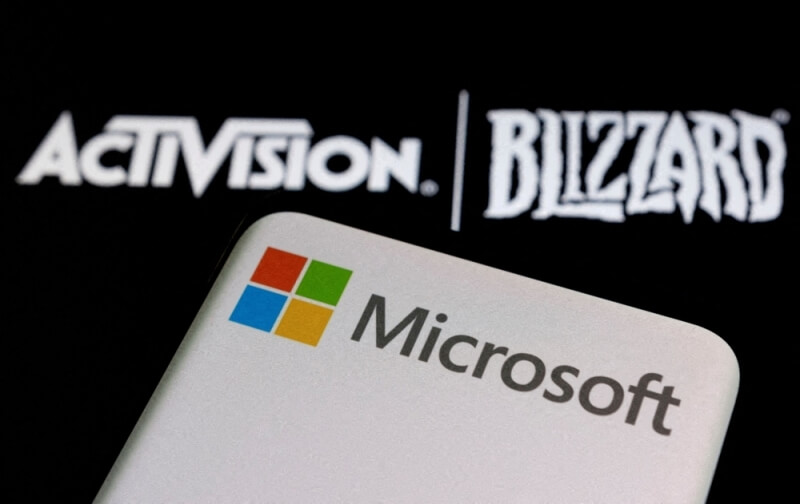In a recent development reported on August 22nd, 2023, video game powerhouse Activision Blizzard, renowned for its acclaimed “Call of Duty” franchise, is taking strategic steps to salvage its $69 billion sale to tech titan Microsoft, following a regulatory roadblock by Britain’s anti-trust regulator. The deal, initially announced by Microsoft in early 2022, aimed to be the largest-ever transaction in the gaming industry, but faced opposition from the Competition and Markets Authority (CMA) in the United Kingdom.
The crux of the CMA’s concern revolved around Microsoft’s perceived dominance in the emerging cloud gaming market, which they feared could stifle competition and innovation. After protracted deliberations, the CMA has recently reaffirmed its original decision to block the Microsoft-Activision Blizzard deal, prompting Microsoft to reevaluate and restructure its proposal in order to gain regulatory approval.
Under the revised agreement, Microsoft will be obliged to relinquish exclusivity rights over popular Activision Blizzard titles such as “Overwatch” and “Diablo” on its own cloud gaming service, Xbox Cloud Gaming. Additionally, Microsoft will not be permitted to control licensing terms for competing cloud gaming services. In a surprising twist, the streaming rights to Activision Blizzard’s gaming catalog will now be transferred to Ubisoft Entertainment, a prominent French gaming company. This maneuver aims to mitigate concerns surrounding Microsoft’s potential market dominance.
Ubisoft’s acquisition of the cloud streaming rights extends to both existing PC and console games developed by Activision Blizzard, along with any new releases the company produces over the next 15 years. However, this arrangement will be applicable worldwide except for Europe, where the European Union’s regulators had already given their acceptance to the original deal. In Europe, Ubisoft will hold a non-exclusive license to utilize Activision Blizzard’s gaming properties within the region.
Notably, legal experts such as Tom Smith, a partner at Geradin Partners and a former legal director at the CMA, expressed cautious optimism about the deal’s prospects, recognizing the intricate nature of contemporary tech deals and the associated regulatory hurdles. Microsoft, for its part, is confident in the viability of its amended proposal, asserting that it significantly diverges from the initial terms.
The CMA has communicated its intention to review the restructured deal through its standard regulatory framework, with a Phase 1 assessment set to conclude on October 18th. If lingering competition concerns persist, the CMA retains the option to initiate a more extensive Phase 2 examination.
The protracted negotiations have already led to extensions of the deal deadline, as both Microsoft and Activision Blizzard sought to navigate the regulatory maze. Industry observers, including Alex Haffner, a competition partner at UK law firm Fladgate, speculate that Microsoft’s latest maneuver indicates a high degree of confidence in securing regulatory approval by the October deadline.
Sarah Cardell, Chief Executive of the CMA, underscored the regulator’s unwavering commitment to maintaining a competitive landscape within the burgeoning cloud gaming sector. She emphasized that the CMA’s core objective remains to safeguard open competition, which in turn drives innovation and choice for consumers.
Of significant note is Microsoft’s substantial concession in opting for this course of action, a move that potentially could have been undertaken earlier in the regulatory process. This development signals a notable victory for the CMA, which has consistently demonstrated a firm stance on technology-related transactions since becoming an independent regulatory entity post-Brexit.
Worth mentioning is the broader international context: the United States Federal Trade Commission had voiced opposition to the deal as well, though its efforts to block it were ultimately unsuccessful. In contrast, the European Union approved the deal after Microsoft made commitments to license Activision Blizzard’s games to other platforms.
The entire sequence of events began in April when the CMA initially announced its intention to thwart the deal, which eventually prompted Microsoft to reevaluate its strategy. A pivotal moment came in July, as the CMA, upon reassessment, remained unconvinced by the changes Microsoft had presented, including commitments accepted by the European Union and a new agreement with Sony.
As the clock ticks toward the looming deadline, Microsoft’s announcement has already had a significant impact on the market. Ubisoft’s shares on the Paris stock exchange saw a notable surge of over 7% at the time of the announcement, making it the standout gainer on the pan-European STOXX 600 index.
the ongoing saga between Activision Blizzard, Microsoft, and the UK’s CMA represents a complex interplay between regulatory scrutiny, corporate strategy, and market dynamics. As the revised deal heads for review and potential approval, the gaming industry and its stakeholders closely monitor the unfolding narrative that could reshape the landscape of cloud gaming and influence the future trajectory of these major players.





